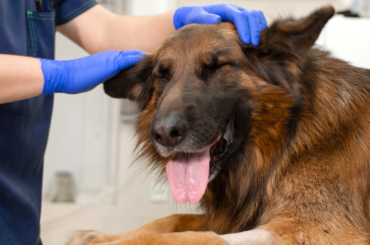The decision to provide supplements to your German Shepherd should always be made with careful consideration of their individual needs, health status, and dietary requirements. While a well-balanced and high-quality diet can often meet the nutritional needs of most dogs, there are situations where supplementation may be beneficial. Let’s delve deeper into the key factors that should guide your decision:
1. Consult with Your Veterinarian:
Before incorporating any supplements into your German Shepherd’s diet, it is crucial to seek professional advice. Your veterinarian will conduct a thorough assessment of your dog’s overall health, review their current diet, and provide recommendations based on specific requirements.
2. Age and Life Stage Considerations:
Understanding your German Shepherd’s life stage is paramount. Puppies, adult dogs, and seniors have varying nutritional needs. Your veterinarian can determine whether supplementation is necessary based on your dog’s age and life stage.
3. Joint Health Support:
German Shepherds are known for their susceptibility to joint issues, such as hip dysplasia. In cases where joint health is a concern, supplements containing glucosamine and chondroitin may be recommended to support and maintain healthy joints, particularly in older dogs.
4. Omega-3 Fatty Acids for Overall Health:
Omega-3 fatty acids, commonly found in fish oil, are renowned for promoting skin health, enhancing coat condition, and potentially exhibiting anti-inflammatory effects. While some commercial dog foods include omega-3 fatty acids, additional supplementation can be considered under veterinary guidance.
5. Addressing Skin and Coat Issues:
If your German Shepherd is experiencing skin problems or has a lackluster coat, your veterinarian might suggest supplements rich in essential fatty acids, such as omega-6 and omega-3, to support skin and coat health.
6. Balancing Vitamin and Mineral Intake:
Supplements may be recommended to address specific vitamin or mineral deficiencies in your dog’s diet. However, it is crucial to exercise caution, as excess amounts of certain vitamins and minerals can be detrimental to your dog’s health.
7. Promoting Digestive Well-being:
Probiotic supplements can play a significant role in maintaining a healthy digestive system. By supporting the balance of gut bacteria, probiotics can alleviate digestive issues and contribute to overall digestive well-being.
8. Considerations During Pregnancy and Lactation:
For pregnant and lactating German Shepherds, there may be increased nutritional demands. In such cases, your veterinarian might recommend specific supplements to ensure the well-being of both the mother and her puppies.
9. Managing Medical Conditions:
Certain medical conditions, like kidney disease or hypothyroidism, may necessitate targeted nutritional support. In such instances, your veterinarian may recommend supplements to address deficiencies or support overall health.
10. Accommodating Dietary Restrictions or Allergies:
If your German Shepherd has dietary restrictions or allergies that limit the intake of certain nutrients, supplements may be essential to ensure they receive a comprehensive and well-rounded diet.
In conclusion, while supplements can serve as valuable additions to your German Shepherd’s diet in specific circumstances, they should never replace a balanced and complete diet. Providing a high-quality dog food that fulfills their nutritional requirements forms the foundation of good health. Always adhere to your veterinarian’s recommendations regarding supplement usage, closely monitor your dog for any changes, and promptly communicate with your veterinarian if you observe any adverse reactions or alterations in your pet’s well-being. The collaborative effort between you and your veterinarian ensures that your German Shepherd receives the most appropriate and tailored care for their individual needs.






